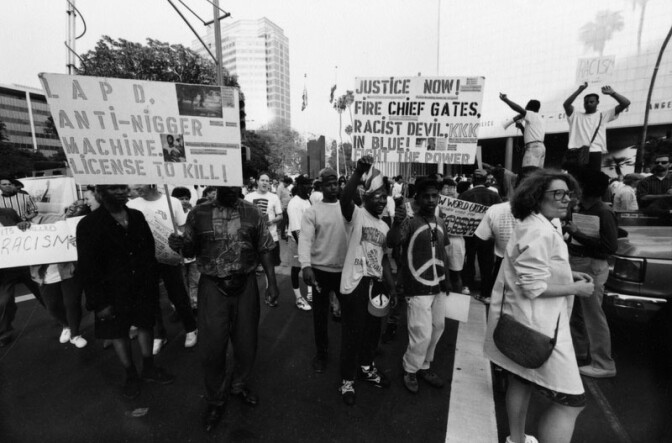This story is free to read because readers choose to support LAist. If you find value in independent local reporting, make a donation to power our newsroom today.
This archival content was originally written for and published on KPCC.org. Keep in mind that links and images may no longer work — and references may be outdated.
Fear of unrest rises for 1st time in post-LA riots poll

More Angelenos today than at any time in the last decade-and-a-half believe that another riot is likely within the next five years. Those are the surprising results of a recent survey from Loyola Marymount University.
Every five years since 1997, political science professor Fernando Guerra has polled L.A. residents about how they perceive their city, and as the LA Times reports, the number of people who believe civil unrest could happen again soon has decreased each time. The project is part of the Center for the Study of Los Angeles, which Guerra founded after the L.A. Riots in 1992. Guerra is also a board member at KPCC.
This week marks the 25th anniversary of the uprising, which was sparked by the acquittal of four Los Angeles police officers involved in the beating of Rodney King.
Guerra says Angelenos are mostly optimistic about the state of race relations and the direction of the city — but one demographic is increasingly pessimistic. "It's actually driven by millennials. Millennials, those who didn't even experience the riots, are more likely to believe that riots are likely in the next five years." Guerra says.
Guerra thinks it's because millennials, shaped by social media, see rioting as a natural extension of other types of political activism.
"You mobilize to vote for civic action, you can even mobilize to protest and march and that rioting would just be a legitimate continuation of that process," he tells KPCC.
Morning Edition host Alex Cohen spoke with Guerra about the survey's details.
Interview highlights:
On “riots” vs. “unrest” in the survey questioning: Different people here use different terms and that can also really shape how you view what happened. How do you frame it?
There is no perfect survey. The word questioning, the word ordering, how you select the respondents — all of that creates biases and every single survey is bias in one way or the other. We try to control all that as much as possible... We feel very comfortable, having studied Los Angeles for over 30 years and trying to have as best a pulse on the city as possible, that we have shaped these questions as unbiased as possible and directed it in a way that helps us understand the city and explain the city to our students.
On the one hand, people are feeling better than they have in quite some time about race relations and yet they’re also feeling that riots might be more likely. Those seem to be findings that are at odds with each other. How do you explain that contrast?
They do, but then you contextualize it, that this survey was actually done in January, during the presidential transition. Los Angeles is incredibly democratic-progressive and protests were occurring and they were being planned and that’s one aspect of it... While they feel good about all kinds of social and economic indicators, this one area is, in a sense, saying “We’re willing to do this, if institutions are not responsive, if they don’t protect us. If they’re not part of who we are, they don’t deserve to be legitimate and to be around.” And riots would be an answer to that. This doesn’t mean that they’re looking for this to occur, it’s just a sense that the underlying aspects are there. One thing that is clear that Angelenos also believe strongly is that economic disparity is increasing and at the end of the day, it’s that disparity that caused the riot. The acquittal in the Rodney King beating might’ve been the spark, but the inequality that existed in ’92, and is even worse today, set the base for that type of action.
It seems to me that there’s something else that’s different now, which is the fact that most people walking around L.A. today have a cell phone with them, which means that any time, we have the technology to capture interactions with authorities and share them almost instantaneously. Can you explain how that might be affecting the entire situation?
The Rodney King video went viral in a time where we didn’t have the internet to the extent that we do [now.] It was taken on one of those gigantic hand-held cameras that’s probably in a museum today. This is what the young people are used to and they’ve seen more of this type of videos than ever before. It doesn’t mean that police-community relations are worse today or that these incidents are occurring more. What it does mean is that we’re seeing a lot more of them.







